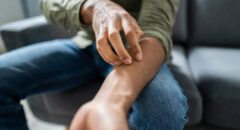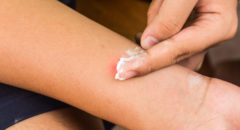
Summer brings long days, outdoor fun, and plenty of sunshine—but for people living with chronic skin conditions like eczema, acne, and psoriasis, the heat and humidity can also mean flare-ups. To help navigate these challenges, we spoke with Dr. Patricia Oyetakin, a board-certified dermatologist in Atlanta, Georgia, known to her patients as Dr. O.
“I treat a wide variety of skin conditions—hair, disorders, and nails,” she explained. “I do treat quite a few inflammatory conditions like eczema, otherwise known as atopic dermatitis, as well as psoriasis, and of course acne—specifically acne as it relates to scarring and hyperpigmentation, especially in darker skin.”
How Summer Disrupts Skin Routines
Dr. O emphasized that maintaining a consistent skincare routine is the first line of defense.
“With any of those inflammatory conditions—eczema, acne, psoriasis—the normal routine and skincare regimen, be it over-the-counter or prescription, gets thrown off by the busyness of the summer,” she said. “Do your best, but certainly keep up with whatever regimen has worked well for you.”
Heat, humidity, and sweat can all be major triggers. For eczema in particular, Dr. O warned that flare-ups happen in two distinct times of year: “In the peak cold winter months, with dryness and less humidity, eczema flares. And then in the other scenario we’re in right now—with heat, sweating, and humidity—that also triggers eczema.”

Managing Eczema in the Heat
Sweat is a significant irritant for eczema. “Sweat produces salt, and it irritates inflamed skin. That can honestly make the areas that are flaring up more raw and painful,” Dr. O said.
Her top recommendations include:
- Lukewarm showers and baths to wash away sweat.
- Regular moisturization, but with lighter lotions in summer instead of heavy creams.
- Spray lotions or thermal water sprays, especially for children, since they can soothe tender skin without painful rubbing.
- Quick rinsing after swimming, as chlorine and saltwater can dry out and irritate skin.
Acne and Humidity
Acne can worsen in hot, humid conditions. “Sweating, humidity, and moisture can cause more flare-ups and pimples,” Dr. O explained.
She recommends over-the-counter products with benzoyl peroxide and salicylic acid to control oil production. For on-the-go cleansing, she suggests gentle micellar water or micellar wipes: “Even just wiping quickly to get that dirt and oil off the skin is helpful.”
One misconception she addressed is skipping moisturizer in summer: “A lot of people think, ‘I don’t have to moisturize in the summer because my skin’s always oily.’ But there’s a difference between oil production and skin barrier health. I still recommend moisturizers—even in warmer months and even with oily skin. The only difference is using something lighter, like a gel.”
Psoriasis in Summer
Interestingly, psoriasis often improves in summer due to sunlight. “Psoriasis is one of those conditions that can get better in the summer,” said Dr. O. “We know UV light can help with the skin. In fact, for some people with psoriasis, we bring them into the office for medical-grade light therapy.”
But she cautioned against overexposure: “If you get a sunburn and you have psoriasis, you may get a new psoriasis flare-up in that particular area. Bug bites are another trigger, so use insect repellent—you don’t want multiple psoriasis spots developing where you’ve been bitten.”
RELATED: Prevent Summer Flare Ups With These 5 Tips!
The Importance of Sun Protection
Perhaps the strongest advice Dr. O shared was around sunscreen and sun protection.
“Sun protection is still very important in all skin types,” she said. “Yes, in darker skin you’re less likely to get skin cancer, but it can still happen. The majority of the reasons why I recommend sun protection, especially with people with inflammatory conditions like eczema and acne, is because UV radiation causes additional inflammation.”
She stressed that sunscreen also prevents hyperpigmentation, which is one of the most common concerns among her patients. “There are studies that show if you have hyperpigmentation and all you do is sunscreen and just moisturize and cleanse—no medications, no skin lightening creams—it actually makes it better. Just sunscreen alone.”
For those who struggle to find sunscreens that don’t leave a white cast, she recommends trying newer formulations and leaning on protective clothing: “Wide-brim hats, breathable long-sleeve shirts, and planning outdoor activities earlier in the day are all part of sun protection—not just sunscreen.”

When to See a Dermatologist
Skin conditions can be confusing and often misdiagnosed, especially in people with darker skin tones. “A lot of the images of psoriasis in dermatology textbooks are in lighter skin,” Dr. O explained. “In darker skin, psoriasis can look reddish dark red, or even purple and gray. It’s very confusing, and often patients with darker skin are diagnosed much later.”
If symptoms persist, she encourages seeking professional care: “If you’re using the same creams, lotions, and potions and it’s still getting worse, you should absolutely see a doctor. You should not live with a rash because it could be something else that really needs medical management.”
She acknowledged that access to dermatology is limited in many areas, but suggested starting with a primary care doctor and considering telemedicine options: “Don’t get discouraged. Be your own advocate.”
Final Thoughts
Clothing choices, hydration, and consistency in skincare routines all make a difference. “Tight-fitting clothing, friction, and rubbing can be an aggravating factor for some skin conditions, especially psoriasis and eczema,” Dr. O concluded. “So just consider that as you try to stay cool, comfortable, and stylish.”
Her message is clear: with the right adjustments, people living with eczema, acne, or psoriasis can enjoy summer while minimizing flare-ups.









